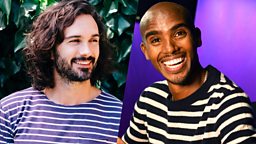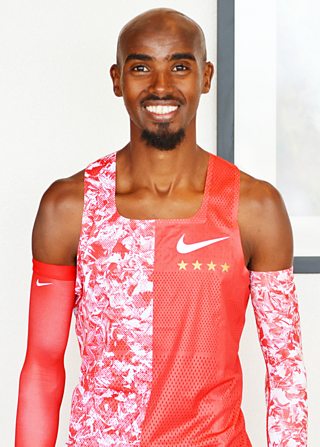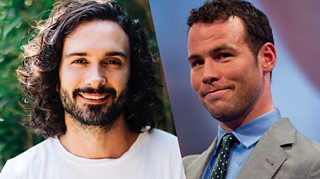Sir Mo Farah: Nine things we learned when he talked to Joe Wicks
The Joe Wicks podcast is back for a second series, with a line-up of brilliant guests from all walks of life discussing physical and mental health. And as well as being available as an audio podcast, the series is now also being filmed for ����ý iPlayer.
Joe kicks things off with one of the greatest British athletes ever, Sir Mo Farah. He tells Joe about his goal of victory at a third Olympic games, the life he might have had without running, and being separated from his identical twin.
Here are nine things we learned...

1. He runs 17 - 18 miles per day
It’s not surprising that a distance runner with four Olympic golds does a lot of running, but the number of miles Mo clocks up is immense. He tells Joe that a typical day starts with “a bit of toast, then go out for a 10 or 12-mile run”. And that’s just the morning. In the afternoon, he’ll do another five or six miles, and on Sundays he’ll usually do 20 miles. Mo says that, just like everyone else, he has days where he can’t be bothered. “There are days in training camp when you get up and think, ‘Mate, I don’t know if I can do it today’,” he says. “But you have to… If you don’t do it, you can’t go and win races.”
It would be nice to make history again.Sir Mo Farah on the Tokyo Olympics
2. His biggest challenge is he’s “no spring chicken”
All being well, Mo will be off to Tokyo in July for the delayed 2020 Olympics. He’s attempting to win a third consecutive Olympic title, unheard of in distance running. “In distance, nobody’s ever done that,” he says. “For me, the challenge gets me excited… It would be nice to make a bit of history again.” Mo will only be running in the 10,000m this time (he’s previously run the 5,000 too). At 38, he says, “I’m no spring chicken anymore. I’m getting on a bit… I think putting myself out there in both events would be difficult. I’d love to have one more title, to make history. To have another medal at the Olympics would be incredible.”

"Just get one more medal, Mo!"
A clip from The Joe Wicks Podcast on ����ý iPlayer.
3. He’s a huge football fan
Despite running well over 100 miles per week, Mo does have some downtime. He says he relaxes by watching football. “I’m a massive fan of Arsenal and often I’m watching my team,” he says. “I watch Match of the Day, kick back… I’m fascinated by it.” As much as he loves to play football too, and might once have liked to do it professionally, Mo says his sporting intelligence is much stronger on the track than on the pitch. “You have to understand it, as well as have the talent. Good thing I worked out running.”

4. He has an identical twin who’s occasionally imitated him
Mo has an identical twin, Hassan. “We really are identical,” he says. “Often people mistake him for me and me for him.” He says his brother has sometimes cheekily enjoyed the fact they look exactly alike: “After 2012 [London Olympics], he stayed with me for a couple of weeks. He went down to Westfield… and people were asking him for photos. He was going, ‘Yeah, I’ll be in the photo!’”
5. He and his brother grew up apart
Mo and Hassan spent much of their life separated. Aged eight, Mo moved from Somalia to the UK with the rest of his family, while Hassan, who was too unwell to travel at the time, stayed behind. Mo, who has twin daughters, says this was really tough: “Having twins myself, I couldn’t separate them, but that was that and you’ve just got to make the best of it.” The brothers remain close and Mo says they share a special bond. “We’re often on the phone together when he’s going through a bad patch… I can feel it [when he’s hurting].”
6. He first met his wife when he was 13
Mo and his wife, Tania, married in 2010, but they’ve known each other since they were schoolchildren, at Feltham School in South London. “We met when we were 13 or 14, but we both went our separate ways, then met up down the line later on,” he says. They were in the same athletics club and friends for a long time, but it was in 2007 they got together properly.
7. Running kept his life on track
When Joe asks what his life might have been like without running, Mo says, “I have to be honest with myself, if it hadn’t been for running, I probably would have gone down the wrong path.” He says he was a kid with lots of energy, who didn’t necessarily know what to do with it. It was on an athletics trip to America as a youth that he realised sport could show him a new world. “We had 10 days in a training camp and three at Disneyland,” he says. “It was incredible. I would never get that chance. My parents couldn’t afford to take me there. I was so grateful.”
8. He’s only Sir Mo on his passport
Mo was knighted in 2017, for services to athletics. He tells Joe, “there are not even words to describe it. It was just incredible.” While he’s immensely proud of his knighthood, Mo says he doesn’t like people to call him ‘Sir Mo Farah’, except when it comes to travelling. “I’ve got it in my passport now,” he says. “I got it renewed a couple of years ago and thought, ‘Maybe I should put it in’.”
[Tokyo] will be difficult without a crowd… I’ve always thrived off the crowd and they give me more energy.Sir Mo Farah
9. He has one big concern about the Tokyo Olympics
Having competed in Beijing, London and Rio Olympic Games, Mo knows what to expect from competition. However, there’s going to be one big difference in Tokyo: because of Covid restrictions, there won’t be any international fans allowed in the venues. It’s currently uncertain how many local fans will be allowed in. That’s a big change for Mo, who says he feeds on the noise of the crowd. In London, the crowd was so loud that he couldn’t even hear the sound of his feet on the track. He says Tokyo “will be difficult without a crowd… I’ve always thrived off the crowd and they give me more energy. At the same time, you need to take a step back and think, this is the Olympics. At least the Olympics is happening.”
More from The Joe Wicks Podcast
-
![]()
Listen on ����ý Sounds – The Joe Wicks Podcast: Sir Mo Farah
Listen to the full interview on ����ý Sounds.
-
![]()
Watch it on ����ý iPlayer – The Joe Wicks Podcast: Sir Mo Farah
Watch the full interview on ����ý iPlayer.
-
![]()
Mark Cavendish: Nine things we learned when he chatted with Joe Wicks
The legendary cyclist talks to Joe Wicks about depression, motorbikes and Lego.
-
![]()
Melissa Alcantara: Nine things we learned when she chatted to Joe Wicks
Joe talks to the legendary personal trainer.





